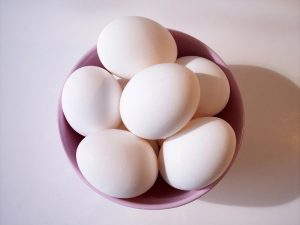
Eggs – sources, health benefits, nutrients, uses and constituents at NaturalPedia.com
Wednesday, June 21, 2017 by Tim Wesley
http://www.naturalpedia.com/eggs-sources-health-benefits-nutrients-uses-and-constituents-at-naturalpedia-com.html

Don’t let their size fool you because these small-shelled breakfast staple are a nutrition powerhouse. There’s so much packed inside a single egg. Not only are they tasty and nutritious, eggs are also very versatile, which means you can do anything with them. There are many types of eggs — quail, duck, goose, bantam — but the most commonly consumed are hen eggs.
List of known nutrients
- Alanine
- Amino acids
- Biotin
- Calcium
- Chromium
- Docosahexaenoic acid
- Iodine
- Iron
- Lecithin
- Lutein
- Lysine
- MSM
- Pantothenic acid
- Phenylalanine
- Phosphorus
- Pyridoxine
- Riboflavin
- Selenium
- Sulfur
- Vitamin A
- Vitamin B2
- Vitamin B12
- Vitamin B5
- Vitamin D
- Vitamin E
- Vitamin K
- Zeaxanthine
- Zinc
Medicinal uses for eggs
Eating eggs regularly will help you become leaner, stronger, sharper, and healthier. It is the ultimate energy booster. When combined with fruit and wholewheat bread, eggs can provide you the energy you need to get through the day. It should also keep you from feeling exhausted easily.
For starters, eggs are packed with protein, which is fundamental to building muscle. A single egg contains six grams of protein and all the essential amino acids (in the right ratios) to help the body make the most out of the protein content. When you have enough protein, you should be able to lose weight, increase muscle mass, optimize bone health, and regular blood pressure.
There’s one misconception about eggs that needs to be addressed: They don’t raise your risk of heart disease and strokes. Egg yolks do have a high cholesterol content, but it’s important to distinguish the difference between dietary cholesterol and blood levels of cholesterol. One study proved that eating whole eggs actually increases HDL (good) cholesterol. Several studies have also shown that there is no connection between egg intake and heart disease.
Eggs are also ideal for people who want to lose weight. Eggs make you feel fuller longer, making you eat less. And since eggs are packed with protein, you can build muscle mass, a process that will also need to burn fat.
Having enough eggs in your diet can decrease your risk of developing cataracts and age-related lens degeneration conditions. The antioxidants lutein and zeaxanthine help keep the eyes healthy while vitamin D helps the body absorb calcium better so it can maintain optimum bone health, helping you avoid osteoporosis.
Eggs are also helpful in treating iron deficiencies. Egg yolks contain iron in the form of heme iron – the most readily absorbed and usable form – that helps improve immunity and energy metabolism. By getting enough iron in your system, you’re less likely to experience tiredness, irritability, and headaches.
Body systems supported by eggs
Your heart will also thank you for eating eggs. Contrary to what most people think, the cholesterol in egg yolks don’t put you at risk of heart diseases. In fact, eggs can spike the levels of good cholesterol in your system. The omega-3 fatty acids reduce blood levels of triglycerides, helping you become safe from heart disease.
Eggs are also good for the eyes. They help keep the retina healthy so you’re not at risk of developing cataracts and macular degeneration. They also contain choline, an important nutrient that not everyone is getting enough of. Choline is essential for building cell membranes.
Ways to use eggs
Fried, poached, boiled, or even raw, eggs will definitely be a part of your daily meals. But there are other ways to enjoy these: quiche, fritatas, sandwiches, casseroles, and a lot more. Here are some easy egg recipes you can try.
Where to learn more
- Eggs are the Answer, not the Enemy
- Eggs offer many health benefits
- Eggs – Consume this natural protein source
- Why organic eggs are a nutritious superfood
- Research: Eggs are a great source of protein, minerals and carotenoids
Summary
Eggs can give you an energy boost.
Eggs improve muscle mass.
Eggs can optimize bone health and prevent osteoporosis.
Eggs help regulate blood pressure.
Eggs increase HDL (good) cholesterol levels.
Eggs support weight loss.
Eggs can treat iron deficiency.
Sources include:
Tagged Under: Tags: eggs






